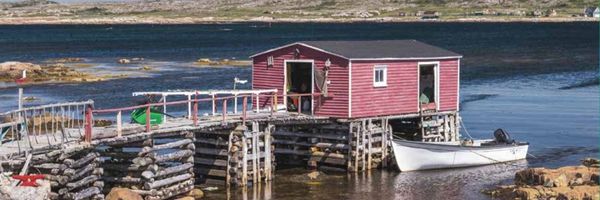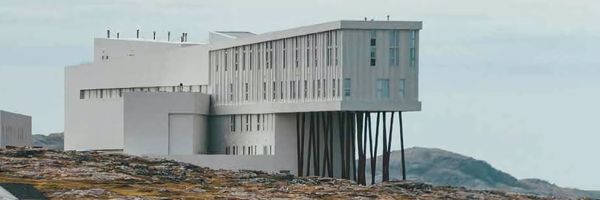Stories Blog / Stories / Thrive Magazine
Fogo Island Framework
Zita Cobb returned to her home island to help build its economy and protect its culture. She ended up spreading its success far beyond its shores

As a former CFO who helped turn JDS Uniphase, an international communications technology company, into one of the most successful high-tech innovators of all time, Zita Cobb knows the language of money. But for the earliest part of her life, she barely spoke it at all. “We traded fish for the things we couldn’t otherwise secure — it was almost as if I grew up in a pre-money time,” Cobb says of her childhood in 1960s Fogo Island, off the coast of Newfoundland and Labrador. There, she grew up the youngest (and only girl) of seven children, among just under 6,000 people “who knew how to make a living on the North Atlantic, which is not the easiest thing in the world.” Things got harder when Cobb, an eighth-generation Fogo Islander, was eight years old. After 400 years, the island’s inshore-fishing industry collapsed due to an unprecedented threat: “the arrival of these monster factory ships from everywhere on Earth.” In the span of 10 years, modern industry displaced centuries of culture, constraining locals’ tiny cod fishing boats — which had never ventured farther than five miles off the coast — even closer to shore.
At first, the older generations couldn’t understand who in their right minds would fish until there’s nothing left to catch, until one day her father figured it out: They must be turning the fish into money.
“So when I was 10 years old, he came to me and said, ‘When you grow up, you’re going to have to go away and you’re going to have to figure out how this money thing works. Because if you don’t, it’s going to eat everything we love.”

Cobb went away to figure out money at Carleton University in Ottawa, but she had big city things to figure out first, “not the least of which was electricity.I remember seeing my first escalator — that was a big thing — and I didn’t know how to use a bus. To this day, Fogo Island still has two stop signs, and no traffic light.” With a career that would be the envy of any businessperson, it’s safe to say Cobb figured this money thing out. But along the way she found a modern world of “placelessness” in which people simply exist to work, disconnected from their immediate environments beyond how those surroundings can serve them. “And when that fundamental relationship to the world is broken, I don’t think humans are at our best.”
It wasn’t Cobb’s plan all along to come home after her career. But after seeing the widespread effects of the corporate world taking local places for granted (“On a good day, corporations are place agnostic — on a bad day, they’re downright hostile”), she felt compelled to protect her hometown. So in 2004, with her father’s words in mind and working with two of her brothers, Cobb returned home with a plan “to put place in the economy.
In 2004 the Cobb siblings started Shorefast, a charity named after the tether that connects a cod trap to shore. Its philosophy is based in part on the work of economist Raghuram Rajan, who explains how the three pillars of human societies — governments, markets and place-based communities — need to work together with philanthropy to create kinder, more effective local economies. But Cobb says these pillars have been too siloed since at least the early ‘70s, when the world started following Milton Friedman’s economic logic of making “increase shareholder value” the singular goal of corporations, which Cobb calls “a terrible marker on the road to the idea that place doesn’t matter.”
At home, the road back started with adding another industry to complement the fishery, which survived on Fogo Island thanks to the creation of a locally owned cooperative — which still runs to this day. The cooperative initially processed cod and, over the years, has adapted to add other species including shrimp, snow crab and turbot as well. But while the fishery is essential to the
island’s economy, Cobb says “it’s not sufficient to life, and cultural continuity on Fogo Island, which we need so we don’t fall out of our own story.” So Shorefast centred Fogo Island’s story around art, “because art is about cultural knowledge,” and hospitality, because while Fogo Islanders are as hospitable as they come, “we just didn’t have a fine inn to practice it.” The artist-in-residence program brings in artists from around the world to live and work in the community. And in addition to building the now locally owned Fogo Island Inn, Shorefast restored and saved several important heritage structures as well.

With a furniture business, ice cream shop and a hand-line cod business (in conjunction with the fishery cooperative), Cobb says the sum of Shorefast’s work adds about $50 million annually to the local economy, and employs about a third of the households on the island. The dream is to get Fogo Island’s population back up over 6,000 after a COVID-caused exodus brought it down to about 2,500 people. But in the meantime, visitors from across Canada and around the world are visiting the island (which is three-and-a-half times bigger than Manhattan), seeing its success and looking at their local worlds differently when they return. By looking inward and focusing on what Fogo Island offers, Cobb says Shorefast “put another leg on the economy” through its asset-based community development, a process that helps people anywhere recognize the real value of their communities. “We’re often blind to what our true assets are,” Cobb says.
“Money is not an asset — it’s a resource. People, nature and culture are assets, and we need to deploy the resources, like money, to support and properly develop them. I believe that an economy needs to underpin the places that people live in, and underpin people’s lives. Otherwise, what’s an economy for?”
Shorefast has already spread its vision for economic resilience beyond Fogo Island’s shores, through its Institute for Place-Based Economies. During COVID lockdowns, it implemented place-based economy pilot projects in four differently sized communities around the country (Victoria, B.C., Hamilton, Prince Edward County and London, Ont). Cobb found that despite differences in size, the work needed to support and connect the pillars in each community was largely the same. And she sees some of this work already being done in Edmonton through Edmonton Community Foundation’s Social Enterprise Fund, which provides debt financing to people looking to improve their communities, but struggle to access traditional financing sources.
For Cobb’s liking, too many businesspeople think they’ll turn their minds to doing good only after the market makes them rich, and not enough philanthropic foundations extend their work to addressing the upstream interventions that Squish Studio, Fogo Island, Newfoundland can strengthen local economies. “But for a community foundation to say, ‘hang on a second, how can we participate in the whole system in a way that goes more upstream?’ That thinking is very ahead of many other foundations.” The Social Enterprise Fund may never help start some giant company, Cobb says, but that’s beside the point. “These are market failures — a market is not going to support the small, the unusual, the much needed, in this way. But this can be solved. It just takes a little miracle, and miracles happen every minute — a miracle is nothing more than a slight shift in how you see something, and when you start to see the power of place and that it holds all the answers, then we’ll all change our systems.”
This story comes from the Summer 2025 Edition of Thrive Magazine.
Read the full issue.